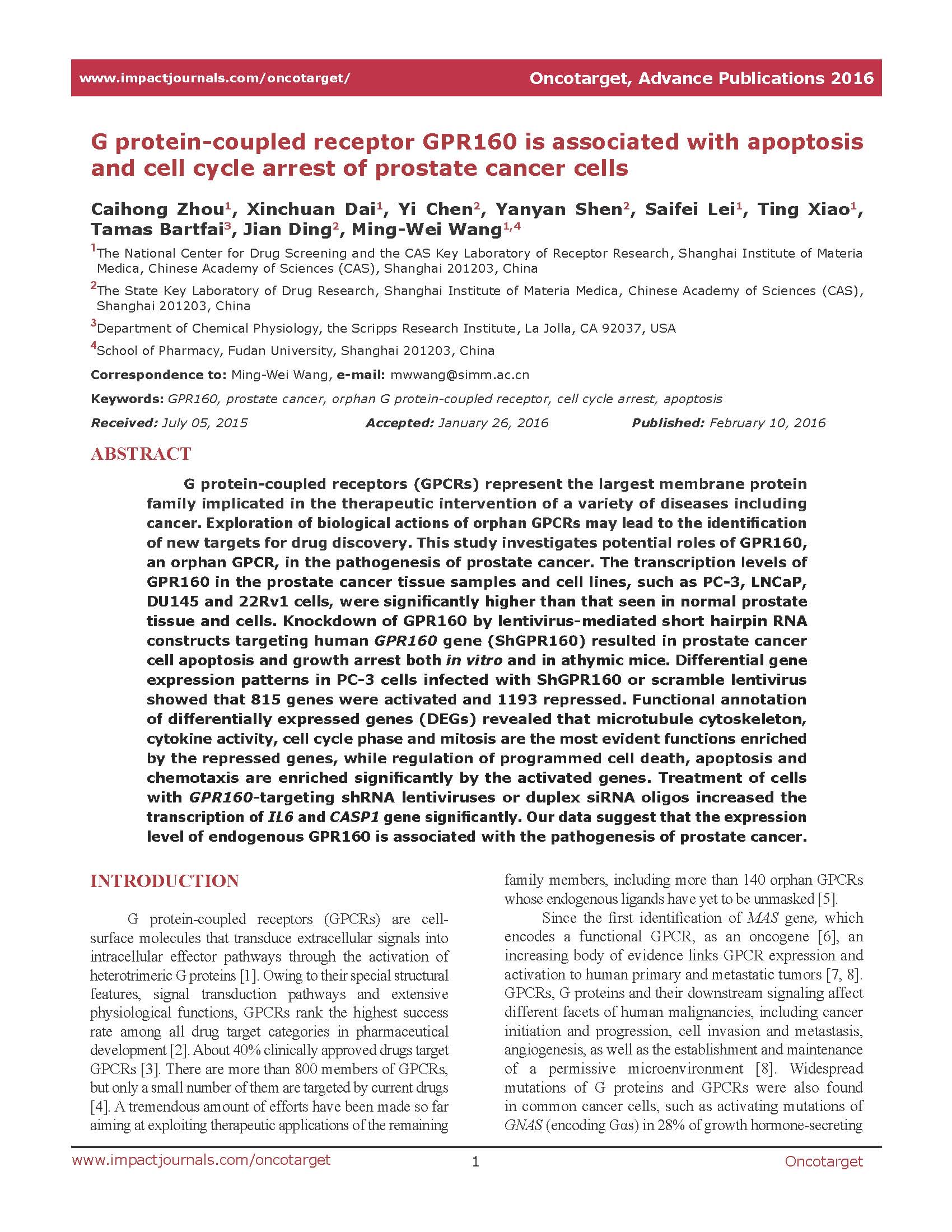G protein-coupled receptors (GPCRs) represent the most successful protein family as drug targets. Their roles in the pathogenesis and progression of cancer are attracting more and more attention. However, endogenous ligands of orphan GPCRs have yet to be identified and their physiological actions remain elusive.
Prostate cancer is currently the most commonly diagnosed non-dermatologic malignancy among males and the second leading cause of death in North America. Although its incidence is relatively lower in China than that in Western nations, it is increasing in recent years especially for advanced stage prostate cancer with poor survival rate. There is an urgent medical need of developing new therapeutic agents to combat this deadly disease.
GPR160 belongs to class A GPCR family. As an orphan receptor, its structure and function are still unknown. A collaborated effort was made between research groups led by Drs. WANG Mingwei and DING Jian of the National Center for Drug Screening/Shanghai Institute of Materia Medica, Chinese Academy of Sciences to elucidate functions orphan GPCRs. In which, they found that the transcription level of GPR160 in certain prostate cancer cell lines and tissue samples was significantly higher than that seen in normal prostate cell and tissues. Knockdown of GPR160 resulted in apoptosis and growth arrest of prostate cancer cells both in vitro and in athymic mice. The differential expression pattern of genes was compared with GeneChip in cells infected with scramble or GPR160-targeting shRNA lentiviruses. Gene ontology and network analyses of differentially expressed genes suggest the potential of GPR160 being a cytokine receptor. Treatment of cells with GPR160-targeting shRNA lentiviruses or duplex siRNA oligos markedly elevated the transcription of IL6 and CASP1 genes. A caspase 1 selective inhibitor partially rescued cell apoptosis induced by GPR160 knockdown.
This original research was headed by Associate Professor ZHOU Caihong and was published online in Oncotarget (DOI:10.18632/oncotarget.7313) on February 10, 2016. It reports the correlation of GPR160 with prostate cancer for the first time, thereby offering the opportunity of discovering novel therapies for prostate cancer targeting GPR160. The work was partially supported by grants from the National Health and Family Planning Commission of China, Chinese Academy of Sciences and Shanghai Science and Technology Commission.
Abstract: G protein-coupled receptors (GPCRs) represent the largest membrane protein family implicated in the therapeutic intervention of a variety of diseases including cancer. Exploration of biological actions of orphan GPCRs may lead to the identification of new targets for drug discovery. This study investigates potential roles of GPR160, an orphan GPCR, in the pathogenesis of prostate cancer. The transcription levels of GPR160 in the prostate cancer tissue samples and cell lines, such as PC-3, LNCaP, DU145 and 22Rv1 cells, were significantly higher than that seen in normal prostate tissue and cells. Knockdown of GPR160 by lentivirus-mediated short hairpin RNA constructs targeting human GPR160 gene (ShGPR160) resulted in prostate cancer cell apoptosis and growth arrest both in vitro and in athymic mice. Differential gene expression patterns in PC-3 cells infected with ShGPR160 or scramble lentivirus showed that 815 genes were activated and 1193 repressed. Functional annotation of differentially expressed genes (DEGs) revealed that microtubule cytoskeleton, cytokine activity, cell cycle phase and mitosis are the most evident functions enriched by the repressed genes, while regulation of programmed cell death, apoptosis and chemotaxis are enriched significantly by the activated genes. Treatment of cells with GPR160-targeting shRNA lentiviruses or duplex siRNA oligos increased the transcription of IL6 and CASP1 gene significantly. Our data suggest that the expression level of endogenous GPR160 is associated with the pathogenesis of prostate cancer.
Keywords: GPR160;prostate cancer;orphan G protein-coupled receptor;cell cycle arrest;apoptosis
Correspondence: Drs. WANG Mingwei
E-mail: mwwang@simm.ac.cn
Original article:
http://www.impactjournals.com/oncotarget/index.php?journal=oncotarget&page=article&op=view&path[]=7313&author-preview=5n5
